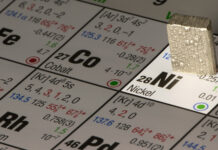
AFRICAN Rainbow Minerals (ARM) posted a 40% decline in headline earnings year-on-year largely owing to continued losses at its $400m Zambian copper mine Lubambe whilst lower commodity prices also heavily hit its coal and nickel operations.
Including the effects of a R1.4bn write-down of Lubambe, ARM’s basic earnings wandered into loss-making territory posting a negative R565m compared to a R104m profit in the 2015 financial year.
Nonetheless, ARM declared its tenth annual consecutive dividend of 225 cents per share, but which was down on the previous year’s 350c/share payout. The group said it was pressing ahead with a review of Lubambe whilst it had postponed the development of an extension project at the time.
“As part of this review all options are currently being considered to maximise value for ARM,” ARM said in its published financial results today. Merchant bankers had been appointed to assist with the review.
However, speaking at the group’s full-year presentation in Johannesburg today, ARM executive chairman, Patrice Motsepe, was more fulsome in his appraisal of the asset, saying the mine would almost certainly be sold at the right price.
“We will be in copper, but that mine [Lubambe] … if we get the right price, we will sell it,” said Motsepe. “That’s absolutely important. There are a lot of other opportunities in copper that we are looking at, absolutely world class,” he said of the group’s growth ambitions.
“We will keep running that mine [Lubambe] in the most value creative way for shareholders, but we also have a duty to not continue in operations where we don’t create value. We have taken everything into account,” he added.
Motsepe confirmed that ARM’s joint venture partner in the asset, Brazil’s Vale, had a pre-emptive right over the South African firm’s stake, but that both partners were considering selling the mine.
“We have spent in excess of $400m [on the mine] which is a huge amount of money. There is an exciting opportunity in the extension area which we think is world class, but over the last three years we have had to look at it, and despite a restructuring, and looking at various interventions, we’ve had to look at that specific asset,” he said.
ARM would remain exposed to copper but there were better opportunities than “the asset we currently own”, he said. “The decision that was taken was that this is an asset that would be better performing with a third party. End of story. We’ve had lots of discussions and there is a huge amount of interest, and will make an announcement at the right time.”
One of the problems encountered at Lubambe was flooding of the mine. Mike Schmidt, CEO of ARM, said fresh investment was needed for the mine to decant 20 million litres a day to surface after originally scoping for a two million litres pumping capacity. This was owing to the closure of adjacent mines by other mining companies amid a decline in the copper price. Lubambe was currently pumping between 8 and 10 million litres of underground water day.
The main driver behind ARM’s performance was its ferrous division – mainly its iron ore assets – whilst there were cut backs in manganese and chrome production. The negatives for the group were ARM Platinum which produced a R415m turnaround in fortunes from a R405m profit in the previous year. This was owing to Nkomati Nickel which was heavily affected by the drop in nickel prices. Modikwa Platinum Mine, however, was finally improving.
ARM Coal posted a R297m headline loss largely owing to interest payments on debt finance. The group was seeking to refinance its debt profile.
Schmidt fired a warning shot across the bows of any asset in the group that was not in the 50th lowest cost quartile over the next two to three years, saying it would be restructured and, if that failed, sold.
During the financial year, ARM also set about restructuring the ARM Broad-Based Economic Empowerment (BBEE) Trust such that some R850m in guarantees provided by ARM to the trust were cancelled. Motsepe said he had “lost sight” of the BEE structure and when he “woke up” there were heavy guarantees in place.
Replacing the guarantees some R1bn in loans were made to the trust from ARM (R800m) and Harmony Gold (R200m). This enabled ARM to restructure its own bank loan which has been reduced to about R300m.
A wholly-owned subsidiary of ARM also bought 12.7 million ARM shares from the trust for R651m. The ARM BBEE Trust was established in 2005 to provide assistance to poor and marginalised communities.
As a result of the refinancing of the trust’s loan structure, ARM’s total borrowings increased to R5.6bn from R3.9bn at the close of the previous financial year. Cash on hand was also reduced to R1.3bn from R2.3bn previously.
ARM said it was “confident” about the long-term prospects of the global mining sector, but added that the recovery in metal and mineral prices would be “relatively slow”.










